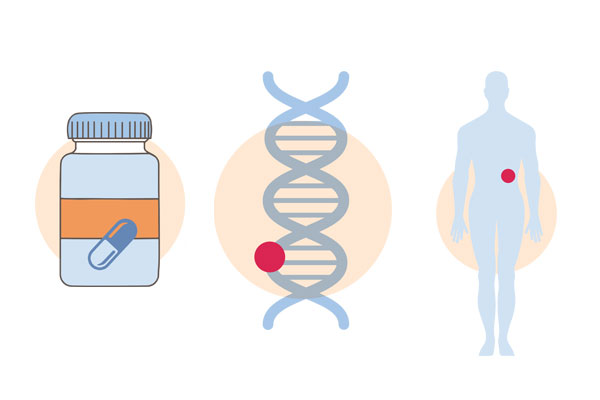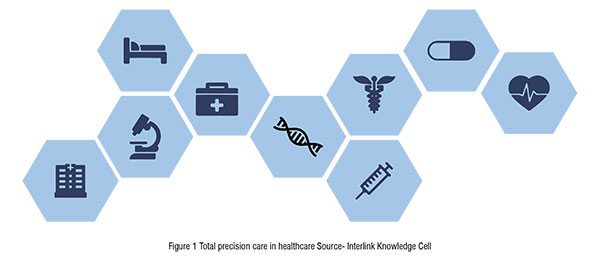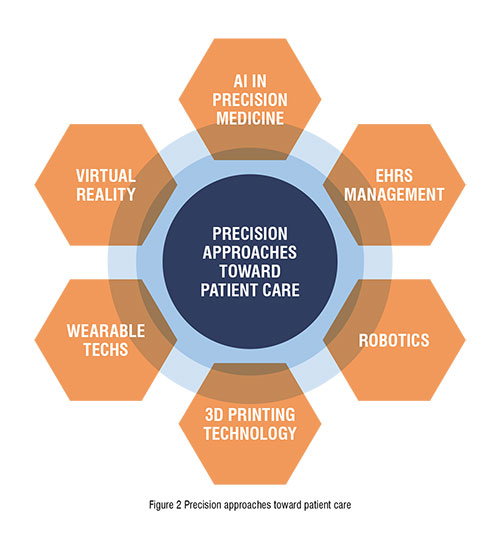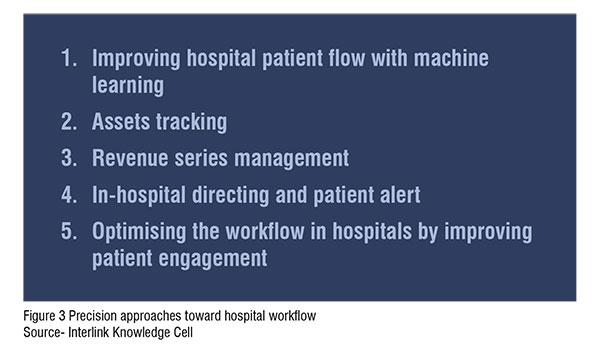With the onset of Covid-19, patients’ perspective has drastically shifted toward targeted, predictive and personalised care which is insisting hospital’s management to become future-proof with advanced precision approaches to meet the future demand. With new research developments and initiatives by hospitals, precision health technologies are gaining much attention in today’s healthcare industry. ‘Predictive-preventivetreatment approach’ is the basic idea behind these precision-based technologies which has proved to be superior in recent times.
While talking about precision approaches in healthcare, the words ‘precision medicines’ pop up first in our mind. Based on patient’s unique genetic makeup, precision medicines are widely used to cure a number of deadly diseases which were literally impossible to treat in the past several decades. However, ‘precision health’ is much more beyond the concept of precision medicines.

Precision health approaches not only include personalised medicines, but a variety of approaches related to hospitals, working procedures, systems, and number of allied frameworks in the healthcare facilities. Hospitals need to be well-precise in various aspects of their working in order to improve patient experience and support hospital management. Figure 1 depicts the journey of a patient through the technology-based precision approaches of hospital management toward recovery and rehabilitation.

In addition to personalised and patient-centred care, early detection and prevention along with the ease to make real-time decisions are some of the aspects which are considered under precision health approaches. Bigdata enables doctors to surf through millions of patients records in a very short time. Knowing the symptom and characteristics, doctors are coming up with the possible best ways to treat their patients with the help of technological approaches which are being widely used in hospitals nowadays. (Figure 1)

The Covid-19 pandemic has created an emergency for healthcare industry and patients are now expecting more promising high-tech offerings from hospitals. In order to meet this everrising demand, with the introduction of artificial intelligence (AI) in healthcare, hospitals nowadays are upgrading themselves with advance technologybased precision approaches. These approaches are as follows
AI in precision medicines - Genomic science is one of the best discoveries forthe healthcare industry; and based on this, a number of leading healthcare providers are using new technological approaches toward more advancements in this area. Genomic data management strategies along with an optimistic execution plan which can engage a huge pool of patients at a time is one of the aims of such kind of approaches.
EHRs management - Most of the healthcare-related technological approaches are concentrated over the electronic health records (EHRs) owing to faster information transfer and efficiently integrated care. Today, hospitals are dealing with multiple EHRs as many have more than one clinical information system which generates a need of integrative platform to coordinate across the entire system. To handle this massive data and to ensure high degree of accuracy and reliability, hospitals are now exploring various systems which can offer greatest flexibility in this task.
Robotics - One of themost promising tools in healthcare, robotics is gaining much attention in hospitals due to its much precise and advanced capabilities. Robot-assisted surgeries are successful most of the times as surgeons can operate such surgeries with a high-definition view along with mechanical arms. This technology is highly beneficial for patients due to its high level of precision, control and flexibility with very few complications and scars.
3D printing technology - To attain a high-degree precision, surgeons today can replicate specifics organs of patients with 3D printing which are very useful for preparing for various procedures. In addition to this, 3D printing can even produce prosthetic limbs and realistic skin. This technology is emerging as a ‘timemoney-resources saving’ technology in healthcare organisations. 3D printing technology is expected to simplify complex procedure to the greater extent in the near future. (Figure 2)

Virtual reality - With the ease of surgery simulation in medical training, virtual reality (VR) is causing wonders in healthcare industry. With this technology, surgeons are able to view 3D images of a patient’s organs and other body parts which resulting into much precise surgeries or operating procedures. Along with doctors, patients are also benefiting with this amazing technology as they can understand their medical condition or treatment plans in much better way.
Wearable Techs - This area of technology is also gaining much attention in recent times. Owing to the precise results about their health status, patients are now becoming increasingly adaptive towards wearable tech and mobile applications. With recent advances,these smart devices are moving beyond the smartwatches and calorie intake to include electronic skin, smart gloves, monitoring patches, sweat sensors, etc.
Improving hospital patient flow with machine learning- Machine learning (ML) is turning out to be a best option in managing the patient flow in hospitals as it offers predictive models which help decision makers with patient flow information. This technology serves real-time data to make much precise decisions. Advantages of ML are as follows
a. Minimises the chances of delay for surgical procedures, admissions and treatments
b. Patient admission procedure is efficiently handled with prioritisation of patients based on their medical condition
c. Prevents overcrowding and diversions in ED
d. Staff schedules are effectively managed with the lesser need for overtime
e. Improves discharge and bed capacity management, etc.
Assets tracking - Supply chain management is very crucial in hospitals as number of elements like retailers, distributors, wholesalers, manufacturers are involved in the process of maintaining inventory. Technological advancements like ‘blockchain-enabled supply chain management system’ are used by various hospitals for better and precise management of their inventory. Reordering quantity at predetermined timing is getting easier due to such kind of technological innovations in healthcare. With the help of trackers on items, the items are easily located, resulting in increased efficiency in the healthcare facilities.
Revenue series management - Again, this can be efficiently managed through blockchain technology to improve precision and efficiency of the revenue cycle of hospital. Introducing blockchain technology in payment process system can minimise the chances of billing and payment errors due to incorrect coding. Automated calculations are one of the greatest advantages of this technology as it can be used while dealing with complex payment contracts. (Figure 3)

In-hospital directing and patient alert - Many hospitals today are equipped with navigation technologies in their architecture. This reduces the struggle of patients and visitors in finding specific section in large hospitals. This navigation features provide turn by turn directions along with messaging and alert systems in the applications.
Moreover, to notify the patient with automated reminders, many hospitals have adopted special technologies which precisely sent notifications to patients including appointment time and exact office/department number. Such kind of alerts also inform patients about changes in time/location of an appointment.
Optimising the workflow in hospitals by improving patient engagement- By tracking and investigating service slowdowns with the help of technology, performance of overall healthcare facility can be improved and precision in the work flow can be achieved. Latest technological advancements are enabling doctors to serve patients with timely monitoring. AI and mobile technologies are enabling better and fruitful engagement between doctors and patients.
3. Precision approaches toward security and hospital design Data security through blockchain - Blockchain technology is very helpful in dealing with security issues which arise due to health information exchange. Owing to the multiple permission layers in blockchain-driven health information exchange, patients can share only relevant parts of their health records with the doctors by declining access to the entire data.
Improving hospital design for precise staff and patient management - Staying in hospitals is mostly stressful and boring, for patients as well as the hospital staff. To the certain extent, hospital designs can promote physical and mental health of patients and can improve their recovery. Moreover, in my opinion, it can also boost the productivity of staff by relieving their stress.
Customised patient rooms can be a good approach toward improving hospital architecture. Refreshing photos, customised music, video call facility with friends are some of the aspects which can be worked on in the hospital. To minimise patient anxiety and promote healing, smart premises can be built with surrounding of nature. Introducing relaxing furniture in staff rooms can reduce working stress and improve productivity of employees.
Proper lighting and noise management also play crucial role in upgrading overall environment of hospital. Mood and perception of pain of patients can be improved with such strategies.
Apollo hospital is one of the famous and much advanced healthcare facilities which is flourishing as a bold example of management adapting greater precision approaches at various levels in their facilities. Discussed ahead is very interesting approach atApollo toward cancer management called ‘precision oncology’.
Precision-diagnosis of cancer - Apollo hospitals perform their revolutionary tests for diagnosis which are known to be game changers in cancer treatment. Liquid biopsy precisely detects cancer with a blood test. Apollo hospitals is the first healthcare provider performing this test in India. Moreover, tumour tissue analysis at Apollo can test for around all known 20,000 cancer pathways in tumour tissue. Apollo also does Gallium 68 scan which is wellknown to detect the precise location of the neuroendocrine tumours.
Precision-treatment of cancer - Having introduced technologies such as Tomotherapy and proton therapy (will be commissioned soon) for cancer treatment in India, Apollo hospitalshave a very precise approach toward chemotherapy, radiation, and also the surgeries. Offering personalised cancer therapies, these treatments (Cyberknife, Tomotherapy and proton therapy) ensure reduced damage to the healthy tissues and fewer side-effects.
Apollo tests for the chemo sensitivity by matching the genome of the cancer and patient. This enables the system to tailor personalised chemotherapy for individual patient. With the help of robotic technology, surgeries are carried out very precisely with lowering the incidences of risks. Moreover, Apollo’s expertise offers allogenic transplants along with autologous transplants.
In many countries including India, demands of patients and hospital management are not fulfilled in time which is an ever-growing concern for entire nation. This needs government interventions on urgent basis and rethinking in terms of optimising inpatient and outpatient settings with the help of digital technologies into hospitals which can truly meet the demands on time.
AI has a very important role to play along with machine learning to develop precision medicines as well as precision approaches in entire framework of the hospital. Early diagnosis and treatment is still somewhat challenging in certain aspects of medical conditions, technologies can overcome them in the near future.
Many hospitals and patients are still not very adaptive toward these new advancements in technology, artificial intelligence should be approved by regulators of hospitals and training should be provided to the organisations, doctors, medical staffs as well as patients. Although these technologies will not replace human clinicians, but will surely extend their efforts in much fruitful manner toward patients. So, it is very necessary to work collaboratively with these technologies in order to be persistent in a longer run.